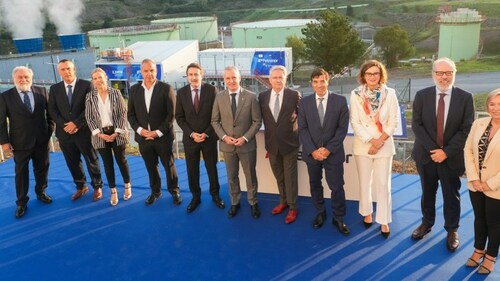
Repsol has started producing renewable hydrogen at its Petronor industrial center in Spain. The 2.5 MW electrolyzer can generate 350 tons per year of renewable hydrogen for industrial use, reducing the carbon footprint of products. The hydrogen is also used to power buses and heavy transport at the Abanto Zierbana Technology Park. Repsol plans to install electrolyzers at its other industrial centers in Spain and aims to achieve net zero emissions by 2050. The company is the leading producer and consumer of hydrogen in Spain, producing around 360,000 tons per year.
- Repsol has started up its first electrolyzer at the Petronor industrial center (Biscay, Spain). With an investment of 11 million euros, this renewable hydrogen has an industrial use in the refinery itself, reducing the carbon footprint of the products.
- The electrolyzer also supplies renewable hydrogen to the Abanto Zierbana Technology Park, where Petronor's new offices are located, where it is used to power buses and heavy goods vehicles.
- Repsol thus marks a milestone in its roadmap towards decarbonization, where renewable hydrogen is one of its keystones for achieving net zero emissions by 2050. The multi-energy company is planning electrolyzers in the vicinity of its five major industrial centers in Spain.
Download document
Repsol has begun producing renewable hydrogen at its Petronor industrial center (Biscay, Spain). The 2.5 MW electrolyzer can generate 350 tons per year of renewable hydrogen for industrial use, mainly in the refinery, as a raw material for manufacturing products with a lower carbon footprint.
Renewable hydrogen is also used in the logistics platform of the Abanto Zierbana Technology Park, located 1.5 kilometers (9.4 miles) from Muskiz, to power buses and heavy transport. To this end, Repsol and the Basque Energy Agency have located the Basque Country’s first hydrogen refueling station there, which obtains hydrogen from the Petronor electrolyzer by means of a pipeline, installed by Nortegas.
The start-up of this electrolyzer is a milestone in Repsol's path towards zero net emissions, in which the transformation of its industrial facilities plays a key role. Petronor will be the site for two more electrolyzers, with a capacity of 10 MW and 100 MW, in the coming years. The latter has been recognized by the European Commission as an Important Project of Common European Interest (IPCEI).
Repsol will install electrolyzers as a decarbonization lever in the vicinity of its other four large industrial centers in Spain. The unit in Cartagena will have a capacity of 100 MW and has also been qualified as an IPCEI. The unit in Tarragona, at 150 MW, will be the largest in Spain and has been selected by the European Commission as an innovative project to receive funds under the Innovation Fund program. Repsol plans to install 30-MW electrolyzers near its industrial complexes in Puertollano and A Coruña.
The company is the leading producer and consumer of hydrogen in Spain. It currently produces around 360,000 tons of hydrogen per year in its industrial facilities, which represents almost 60% of the Spain’s demand.
Renewable hydrogen, feedstock for products with a lower carbon footprint
Renewable hydrogen is used as a feedstock in processes to manufacture products with a lower carbon footprint, such as renewable fuels. In addition, the development of these electrolyzers will enable the deployment of the necessary infrastructure for the use of hydrogen in industry, mobility, the gas sector and renewable electricity, thus promoting European manufacturing associated with these sectors.
Repsol plans to deploy a network of renewable hydrogen supply points in the vicinity of its industrial centers, as well as in the main logistics corridors of the peninsula, where transport demand is significant enough to locate an electrolyzer. Due to its relevance and ambition, this project has been selected by the European Commission to receive funding under its CEF (Connecting Europe Facility) program.
The start-up of this electrolyzer is also an important step for the Basque Hydrogen Corridor (BH2C), one of the most significant regional renewable hydrogen initiatives in Spain. Promoted by Repsol and Petronor, its objective is to create an ecosystem that is as efficient as possible, both in terms of manufacturing, transformation and logistics costs, coupling production capacity to the needs of the surrounding and newly created industry, as well as diversifying the uses of renewable hydrogen.
In addition to the Basque Hydrogen Corridor, Repsol is leading important regional initiatives to promote the creation of hydrogen clusters, such as the Hydrogen Valley of Catalonia, promoted by Repsol and Enagas, and coordinated by the Universitat Rovira i Virgili (URV); the Hydrogen Valley of the Region of Murcia, where Repsol is one of the main promoters; and also highlights its participation in the hydrogen cluster of Castilla-La Mancha.